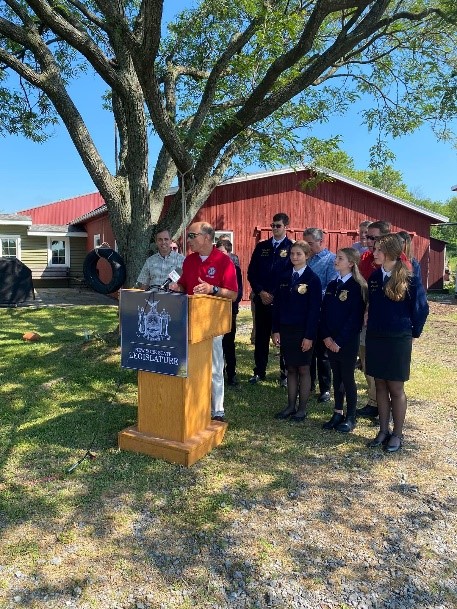Lemondes, Borrello Host Joint Press Conference Calling For Further Agricultural Education In New York Schools
Assemblyman John Lemondes (R,C,I-Lafayette) and Sen. George Borrello (R,C,I,LIBT-Sunset Bay) today were joined by legislative colleagues, agriculture industry professionals, education professionals and local leadership at a press conference to champion the further implementation of agricultural education in New York state schools.
New York’s agriculture industry, valued at about $5.75 billion, is booming with opportunity, yet New Yorkers very often tend to not go into the field for their careers, or understand where their food comes from. Lemondes and Borrello are hoping their bill changes the relationship between farms and New Yorkers statewide for generations to come.
“The fact is that most people really don’t know what goes into operating a farm, and what it takes to get the products we’ve all come to enjoy into stores or on the table,” Lemondes said. “The hope with this bill is to shift the education paradigm in a way that doesn’t disrupt the important lessons students are already learning, but supplement it with practical hands-on exposure to develop an earlier appreciation for the work that farmers and their teams do, and the effort it takes to deliver the food we all enjoy. I’m very hopeful that with this one change, we as a state can begin to have a conversation towards the importance of this work, which includes discussions around conservation, running a business and community.”
The bill, labeled (A.9230/S.8641), will amend education law to require all schools that receive public funding to provide agricultural-related instruction to all students in elementary, middle and high school. The bill is intended to help students understand where their food comes from and the importance of sustainability and resource conservation to protect New York’s food supply.
“Integrating agriculture education into K-12 curriculums will help bridge the growing knowledge gap about where our food comes from and the importance of sustainability and resource conservation while creating new opportunities for agriculture-based STEM learning,” said Borrello. “Ag education is also the best way to strengthen the farming and agribusiness talent pipeline that is currently falling short. In order to feed a growing world, food production will need to rise 60 percent over the next three decades. In order to meet that goal, we will need exponentially more skilled workers at every level, from farm hands and managers to veterinarians and soil experts and beyond. Right now, many children have no idea about the varied career possibilities that exist in agriculture. The first step towards correcting that is enacting this measure into law.”
